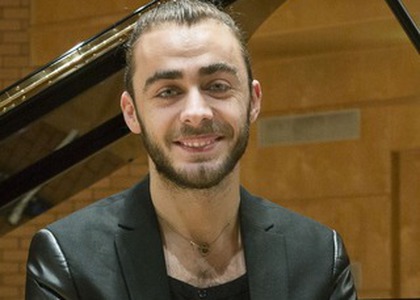> Interviews

Interview with pianist Daniel Ciobanu
Radio România regularly hosts special recording sessions, inviting both promising young artists and established musicians. In this context, pianist Daniel Ciobanu has recently completed a series of special recordings at the Radio România Studios. In this interview with our colleague Ioana Țintea, the musician speaks about this experience, as well as his upcoming appearance on the stage of the Romanian Athenaeum in the concerts scheduled for this week.
Daniel Ciobanu, what does returning to the Radio România Studios alongside a team you've worked with before mean to you?
I'm very glad that, at the last minute, we managed to put this collaboration together and return to the studios with a project that's very close to my heart. It's been a fantasy of mine for many years nowto create an ensemble in Romania, made up of young musicians from the orchestras in Bucharest, with whom we could experiment, really. We work without a conductor - it's just us among ourselves, with a program quite flamboyant in its mix of styles: jazz, Romanian folk, film music, and arrangements written specifically for us. I want to thank Mrs. Cristina Comandașu first and foremost, as she managed to pull this rabbit out of the hat in record time and helped us achieve this first recording, a historic moment for what I hope will become an internationally recognized ensemble.
What can you tell us about the works you chose to record?
We began with a piece by composer Gerald Finzi - Eclogue for piano and strings - a sort of pseudo-film music, which creates a more surreal atmosphere, lifting us off the gravitational plane. Then we came back in strong contrast, very much grounded, with two pieces from Romanian folklore featuring vocalist Monica Băjenaru, followed by a premiere that will be broadcast on the radio - Rachmaninoff's Romance, No. 1, Op. 6, arranged by composer Adrian Stroici especially for us, transforming it from piano and violin to an arrangement for string ensemble. Then there's a samba by the Vision Quartet, played only in pizzicato, a contemporary piece. It's a very colorful bouquet, and we sort of shift between polar opposites in our roles. That's actually what I hope becomes our DNA, to be able to chameleon ourselves into as many styles as possible and offer a diverse experience that can attract a wide, young audience.
Beyond the music, what truly remains after such a recording experience?
As always, what remains is the essence of making music together. Previously, I recorded a solo album, of course, I worked with sound engineers, which is also a kind of chamber music since there's a form of dialogue there, but this time, real harmony was created among the musicians. To me, that's a huge bonus in life: being able to unite emotionally and create a shared, personal imprint.
Are there plans for these recordings to materialize into a future album project?
Let's hope so. We already have a concert confirmed in Piatra Neamț this December, and we're waiting on a few more confirmations. Hopefully, this will spark some interest from record labels as well, so we can leave behind a few souvenirs in the history of music.
Let's talk about the concert you'll be performing at the Romanian Athenaeum this week - Rachmaninoff's Piano Concerto No. 2 in C minor, one of the most performed and applauded pieces in the piano repertoire. How do you relate to such a well-known and beloved opus?
It's definitely a challenge to go on stage in 2025 with Rachmaninoff's Concerto No. 2. The music is written so organically that it feels like it sits very differently in each pianist's hands. I've rarely heard two performances alike, and even more rarely ones that match what I personally like to hear in Rachmaninoff's concerto. So, in a way, despite its popularity, it has a unique kind of pheromone that draws the artist to create their own reality with this piece, maybe even involuntarily. That's probably why it manages to endure and keep being rediscovered and replayed endlessly without tiring us.
How do you feel about transitioning this week from the intimate atmosphere of the recording studio to the intensity of a live concert in front of the audience at the Romanian Athenaeum?
Completely different: from this intimate space where your heartbeat sets the tempo, to something absolutely colossal, a kind of stringed Tutankhamun, a piece with a lot of sonic gravitas. I really enjoy extremes, I like dramatic changes à la Tarantino, and I say: "challenge accepted."
Translated by Marian-Cătălin Niculăescu,
University of Bucharest, Faculty of Foreign Languages and Literatures, MTTLC, year II
Corrected by Silvia Petrescu














